
NEW DELHI - As the world marks Refugee Day Friday, India continues to provide shelter to refugees from several countries who lead a relatively peaceful life here compared to their troubled homelands which they fled, though many problems persist. According to the United Nations High Commissioner for Refugees (UNHCR), India has some 200,000 refugees from various countries.

Of these, over 100,000 are Tibetan refugees while 60,000 are Sri Lankan Tamils. Over 3,000 of them are asylum seekers. While some human rights activists feel that India's record in extending refuge is better than most other countries, others think the overall situation is dismal. "India's record in terms of accommodating refugees is much better than other countries in the world," senior lawyer and activist Ashok Agarwal told IANS. Agarwal has been counsel in many cases of defending refugees in the country. Apart from people from Afghanistan and Bangladesh, the subcontinent is home to Pakistani Hindus and Rohingya Muslims from Myanmar. Agarwal says that India is yet to evolve a set of principles by which refugees will be enabled to live "with a minimal degree of dignity".
Ravi Nair from the South Asian Human Rights Documentation Centre says that India is biased towards Tibetan refugees because of "geopolitical compulsions".
"India is only good to Tibetans. Chin refugees from Burma, Afghans and people from Somalia and Sudan are discriminated against," Nair told IANS, as he lamented the absence of any law on refugees, with an over half-century old law governing them.
"It is ironical that we are still dependent on the 1948 Foreigner Act which is of no use," he said. The UNHCR says that refugees in India have livelihood challenges and face discrimination from local communities. Most of them work as daily wage labourers.
Ravi Nair from the South Asian Human Rights Documentation Centre says that India is biased towards Tibetan refugees because of "geopolitical compulsions".
"India is only good to Tibetans. Chin refugees from Burma, Afghans and people from Somalia and Sudan are discriminated against," Nair told IANS, as he lamented the absence of any law on refugees, with an over half-century old law governing them.
"It is ironical that we are still dependent on the 1948 Foreigner Act which is of no use," he said. The UNHCR says that refugees in India have livelihood challenges and face discrimination from local communities. Most of them work as daily wage labourers.

 RSS Feed
RSS Feed
